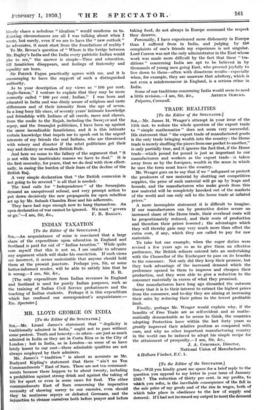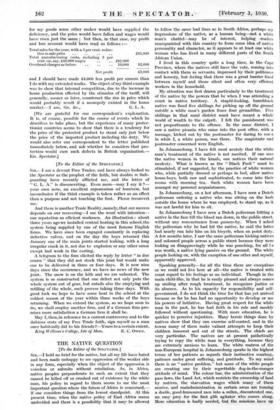[To the Editor of the SPECTATOR.) Sm,—Will you kindly grant
me space for a brief reply to the question you append to my letter in your issue of January 25th ? The reduction of thirty per cent. In my profits, to which you refer, is the inevitable consequence of the fall in the sale price of my goods and of the rise in wages, both of which take place in obedience to the law of supply and demand. If I had not increased my output to meet the demand for my goods some other maker would have supplied the deficiency, and the price would have fallen and wages would have risen just the same ; but then, in that case, my profit and loss account would have read as follows :-
Total sales for the year, with a 5 per cent. reduc- tion in sale price . . . . . .
Total {manufacturing costs, including 5 per cent. on, say, £40,000 wages . .
Overhead charges as before . . . . .
Net profit £3,000 and I should have made £4,000 less profit per annum than I do with my extended works. The object of my third example was to show that internal competition, due to the increase in home production effected by the stimulus of the tariff, will generally, sooner or later, counteract the rise in price which would probably result if a monopoly existed in the home £95,000 £82,000 10,000 92,000
[We are grateful for our correspondent's, explanation.
It is, of course, possible for the course of events which he describes to take place, but the experience of many protec-
tionist countries seems to show that there is a tendency for the price of the protected product to stand only just below the price of the imported product including the duty. We would also refer our 'correspondent to the letter published immediately below, and ask whether he considers that pro- tection would cure such defects in British organization.—
En. Spectator.]







































 Previous page
Previous page